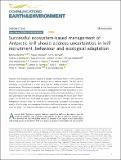Files in this item
Successful ecosystem-based management of Antarctic krill should address uncertainties in krill recruitment, behaviour and ecological adaptation
Item metadata
| dc.contributor.author | Meyer, Bettina | |
| dc.contributor.author | Atkinson, Angus | |
| dc.contributor.author | Bernard, Kim S. | |
| dc.contributor.author | Brierley, Andrew S. | |
| dc.contributor.author | Driscoll, Ryan | |
| dc.contributor.author | Hill, Simeon L. | |
| dc.contributor.author | Marschoff, Enrique | |
| dc.contributor.author | Maschette, Dale | |
| dc.contributor.author | Perry, Frances A. | |
| dc.contributor.author | Reiss, Christian S. | |
| dc.contributor.author | Rombolá, Emilce | |
| dc.contributor.author | Tarling, Geraint A. | |
| dc.contributor.author | Thorpe, Sally E. | |
| dc.contributor.author | Trathan, Philip N. | |
| dc.contributor.author | Zhu, Guoping | |
| dc.contributor.author | Kawaguchi, So | |
| dc.date.accessioned | 2020-11-18T16:30:10Z | |
| dc.date.available | 2020-11-18T16:30:10Z | |
| dc.date.issued | 2020-10-15 | |
| dc.identifier | 271270157 | |
| dc.identifier | 410fe1c8-f2ab-41f8-9bc6-d8914efe23e8 | |
| dc.identifier | 000648592900001 | |
| dc.identifier | 85100112778 | |
| dc.identifier.citation | Meyer , B , Atkinson , A , Bernard , K S , Brierley , A S , Driscoll , R , Hill , S L , Marschoff , E , Maschette , D , Perry , F A , Reiss , C S , Rombolá , E , Tarling , G A , Thorpe , S E , Trathan , P N , Zhu , G & Kawaguchi , S 2020 , ' Successful ecosystem-based management of Antarctic krill should address uncertainties in krill recruitment, behaviour and ecological adaptation ' , Communications Earth & Environment , vol. 1 , 28 . https://doi.org/10.1038/s43247-020-00026-1 | en |
| dc.identifier.issn | 2662-4435 | |
| dc.identifier.other | Jisc: 32758f79c7254eb596fa076f71fa0447 | |
| dc.identifier.other | publisher-id: s43247-020-00026-1 | |
| dc.identifier.other | manuscript: 26 | |
| dc.identifier.uri | https://hdl.handle.net/10023/21005 | |
| dc.description | This publication and the scientific position of R.D. was supported by a grant awarded to B.M. from the Federal Ministry of Food and Agriculture (BMEL, Project KrillBIS II, grant number 2819HS001) and contribute to the Helmholtz Research Program “Changing Earth—Sustaining our future” of the research field Earth and Environment of the Helmholtz Association, Topic 6, Suptopic 6.1. G.Z. was supported partly by the National Science Foundation of China (NSFC, grant number 41776185) and the National Key R&D Program of China (NKRDPC, grant number 2018YFC1406801). S.L.H., G.A.T., S.E.T., and P.N.T. were supported by the Natural Environment Research Council (NERC) funding to the Ecosystems programme at the British Antarctic Survey. A.A. was supported by NERC through its ‘Climate Linked Atlantic Sector Science’ (NE/R015953/1). A.A. and S.L.H. received additional support from WWF. S.K. was supported by Australian Antarctic Science Program number 4512. | en |
| dc.description.abstract | Antarctic krill, Euphausia superba, supports a valuable commercial fishery in the Southwest Atlantic, which holds the highest krill densities and is warming rapidly. The krill catch is increasing, is concentrated in a small area, and has shifted seasonally from summer to autumn/winter. The fishery is managed by the Commission for the Conservation of Antarctic Marine Living Resources, with the main goal of safeguarding the large populations of krill-dependent predators. Here we show that, because of the restricted distribution of successfully spawning krill and high inter-annual variability in their biomass, the risk of direct fishery impacts on the krill stock itself might be higher than previously thought. We show how management benefits could be achieved by incorporating uncertainty surrounding key aspects of krill ecology into management decisions, and how knowledge can be improved in these key areas. This improved information may be supplied, in part, by the fishery itself. | |
| dc.format.extent | 12 | |
| dc.format.extent | 3145278 | |
| dc.language.iso | eng | |
| dc.relation.ispartof | Communications Earth & Environment | en |
| dc.subject | Climate sciences | en |
| dc.subject | Ecology | en |
| dc.subject | Ecosystem ecology | en |
| dc.subject | QH301 Biology | en |
| dc.subject | SDG 14 - Life Below Water | en |
| dc.subject.lcc | QH301 | en |
| dc.title | Successful ecosystem-based management of Antarctic krill should address uncertainties in krill recruitment, behaviour and ecological adaptation | en |
| dc.type | Journal item | en |
| dc.contributor.institution | University of St Andrews. Scottish Oceans Institute | en |
| dc.contributor.institution | University of St Andrews. School of Biology | en |
| dc.contributor.institution | University of St Andrews. Centre for Research into Ecological & Environmental Modelling | en |
| dc.contributor.institution | University of St Andrews. Pelagic Ecology Research Group | en |
| dc.contributor.institution | University of St Andrews. Marine Alliance for Science & Technology Scotland | en |
| dc.identifier.doi | https://doi.org/10.1038/s43247-020-00026-1 | |
| dc.description.status | Peer reviewed | en |
This item appears in the following Collection(s)
Items in the St Andrews Research Repository are protected by copyright, with all rights reserved, unless otherwise indicated.

